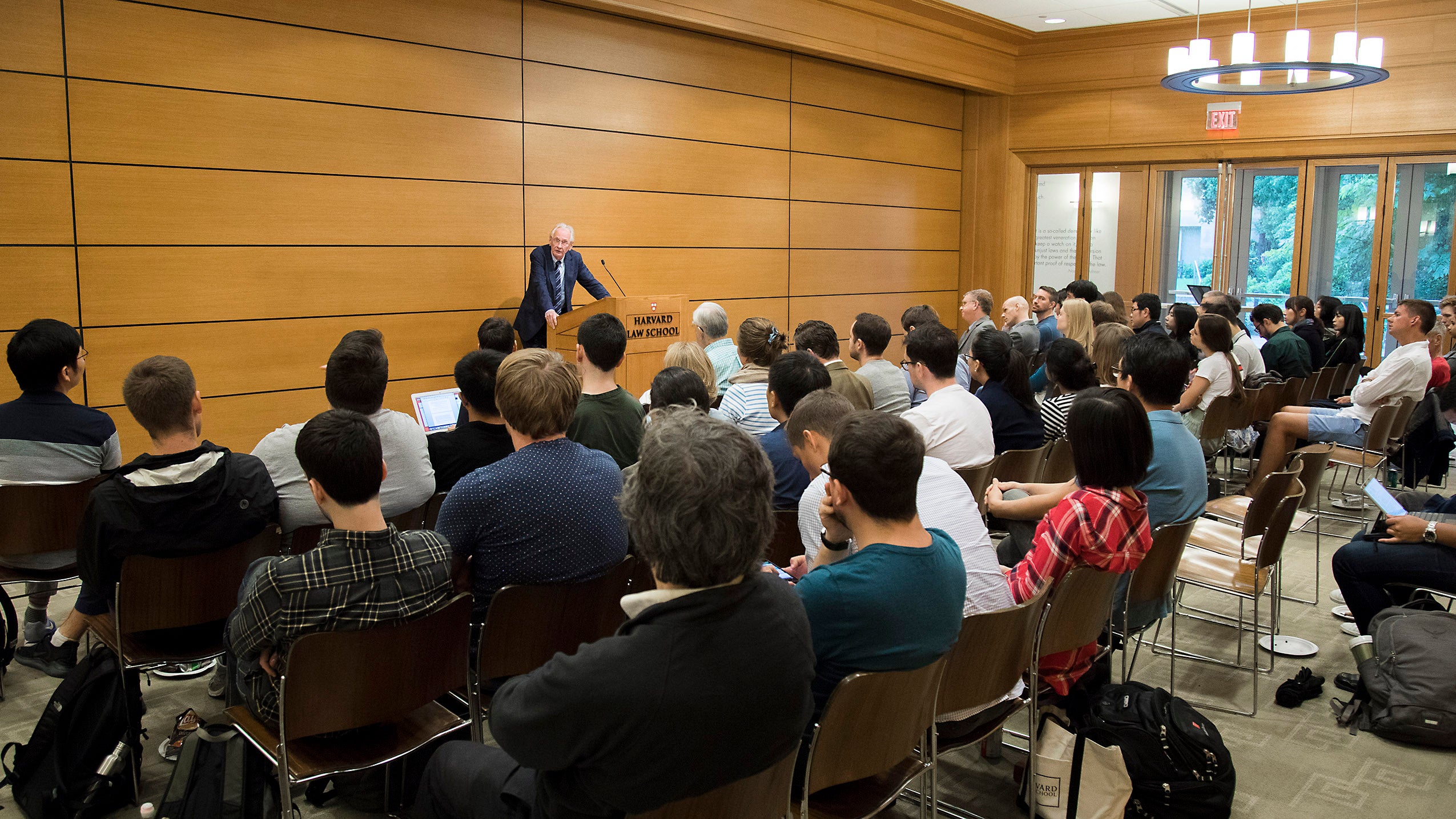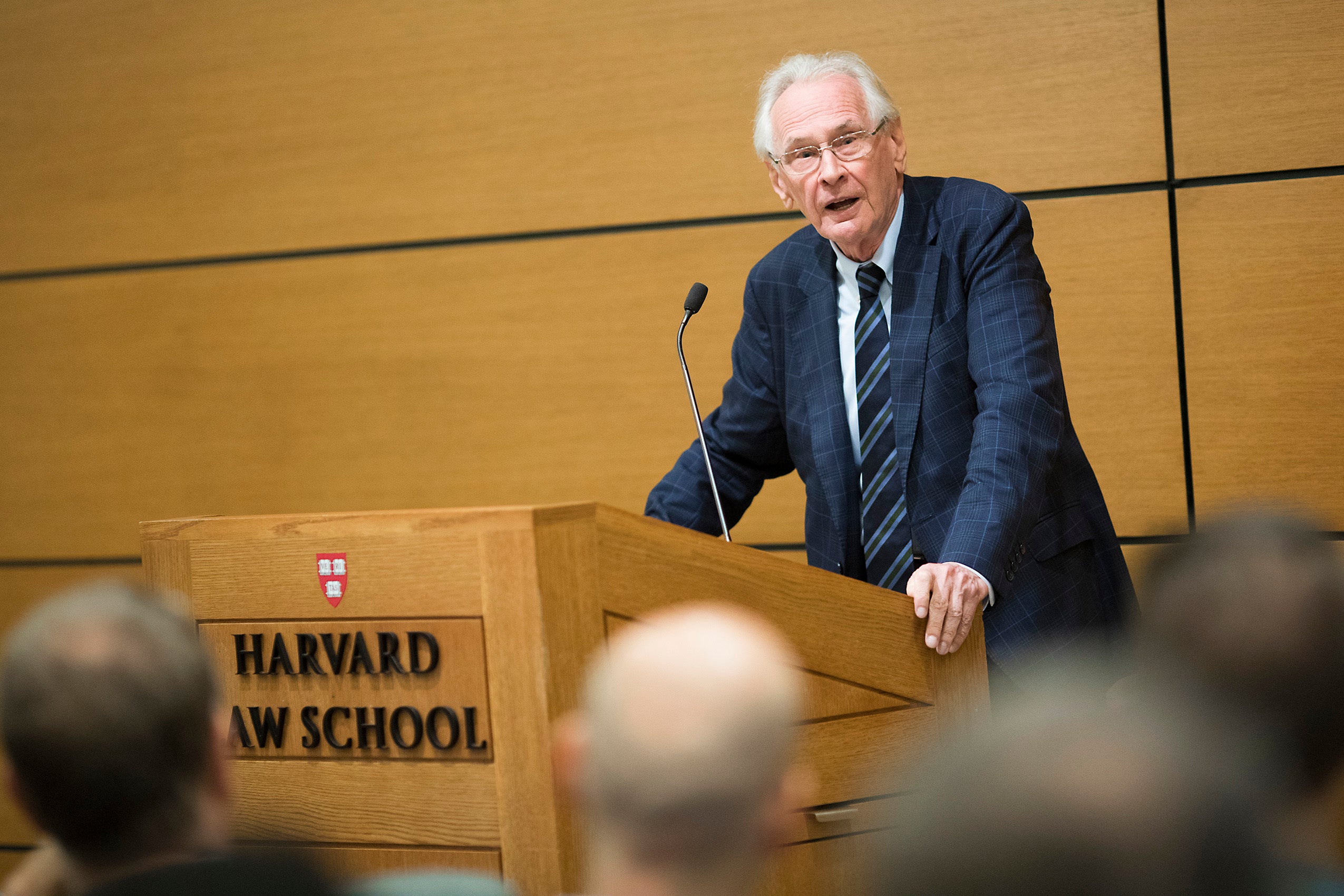Dieter Grimm LL.M. ’65, a former justice of the Federal Constitutional Court of Germany, returned to Harvard Law School on September 18 to speak on “Courts under Political Pressure.” Grimm, a noted scholar, academic and public intellectual, was introduced by Professor William Alford, Vice Dean for the Graduate Program and International Legal Studies.
“Toward the end of the 20th century, it looked as if constitutionalism had established itself definitely around the world,” Grimm observed. “Many countries that had freed themselves from dictatorships, from authoritarian regimes, racist regimes, military regimes, transformed themselves into liberal democracies. New constitutions were adopted, old constitutions were thoroughly rewritten, and the willingness to take constitutions seriously had grown, and almost all of these new democracies established constitutional courts, or supreme courts with the power of judicial review. Now, 25 years later, the constitutional world looks much different. A number of the constitutions that were established at that time have taken an illiberal turn or are openly disregarded.”
With the exception of the United States, the establishment of judicial review in most countries has been a deliberate decision made by politicians. “Constitutional adjudication is an act of self-limitation — why do they do it?”, he asked.
Austria was the first country to have a specialized constitutional court, but judicial review was only introduced on a broad scale after World War II. In Italy and Germany, “there was a strong conversation that I can only explain in two words: Never again. Never again the self-destruction of a democracy, and never again the total neglect of fundamental rights,” Grimm noted. Recent scholars have adopted a less idealistic, more realistic explanation, arguing that politicians are rational actors.
“It is not true, in my view, that political actors only think strategically, or are exclusively motivated by personal interests or institutional self-interest. I think ideals and principles play a role, especially after a fundamental break with a past regime,” Grimm observed. “Constitution-making is often not a dictate of a majority but a consensus, a compromise between a majority and a minority, and then it is a good idea to think of the necessity of an umpire if situations change.”
Grimm turned next to what happens when conflicts arise. “Constitutions impose constraints on politics and constitutional courts enforce these constraints,” he observed. “The fact that political rivals agreed in the founding moment on judicial review doesn’t immunize these courts against political pressures. Jurisprudence may take an unexpected turn, politicians may face unexpected challenges, and the court appears as an obstacle to pursuing the common good.” This shift is especially likely, he noted, when a country finds itself in a deep crisis, whose solution requires unorthodox means. In the United States during the Great Depression, for instance, when Franklin Delano Roosevelt’s efforts to regulate the economy were declared unconstitutional by the Supreme Court, FDR responded by proposing (but never actually implementing) a court-packing plan intended to eliminate this obstacle.

Citing Austria in the 1930s, post-Soviet Russia, and eastern European countries in recent years, Grimm discussed the goals, means and outcomes of political interference with the composition or powers of constitutional courts. In some instances, patterns repeated themselves; in others, as more constitutional courts emerged, new pressures did as well. In Hungary in 2010 and Poland in 2015, for instance, opposition political parties won a political majority in free elections. Unlike FDR’s efforts in the 1930s, “the problem was not that certain legislative acts fail in the constitutional courts; rather, the existence of an institution with the power to annul a majority decision is what bothers the new rulers,” he explained. In Hungary, the new ruling party imposed limits on the court’s powers of judicial review, and subsequently adopted a new constitution that declared all previous constitutional court judgments null and void. In Poland, the former majority party quickly appointed judges and amended rules and procedures, effectively paralyzing the court. In situations like this, “the establishment of an authoritarian government is justified in the name of democracy, yet it is a concept of democracy that is alien to the concept of constitutionalism,“ he argued.
“I don’t think that judicial review is irreconcilable with democracy, nor do I think that a democratic system requires judicial review. But experience shows that in most countries, the constitution would matter little without judicial review,” concluded Grimm. “Of course, constitutional jurisprudence may be changed by constitutional amendment; statutes on the constitutional court may be changed by legislation. But there are limits. If the constitution establishes judicial review, constitutional amendments or statutes that prevent the court from exercising its function are unconstitutional.”
Grimm served as a justice on the Federal Constitutional Court of Germany from 1987 to 1999. He is a permanent fellow and former rector at the Wissenschaftskolleg zu Berlin Institute for Advanced Study, and a professor emeritus of law at Humboldt University of Berlin. Grimm has been a visiting professor at HLS and at universities around the world. His recent publications include Constitutionalism: Past, Present, and Future (Oxford University Press, 2016) and Sovereignty: The Origin and Future of a Political Concept (Columbia University Press, 2015). An honorary member of the American Academy of Arts and Sciences, he holds a law degree from the University of Frankfurt and an LL.M. from Harvard Law School.
